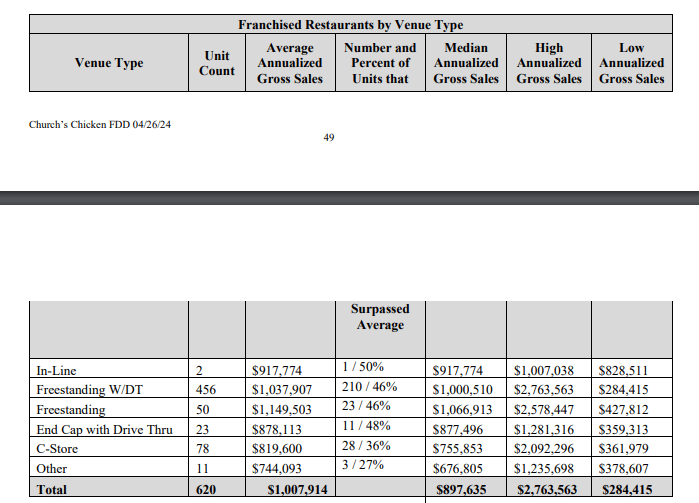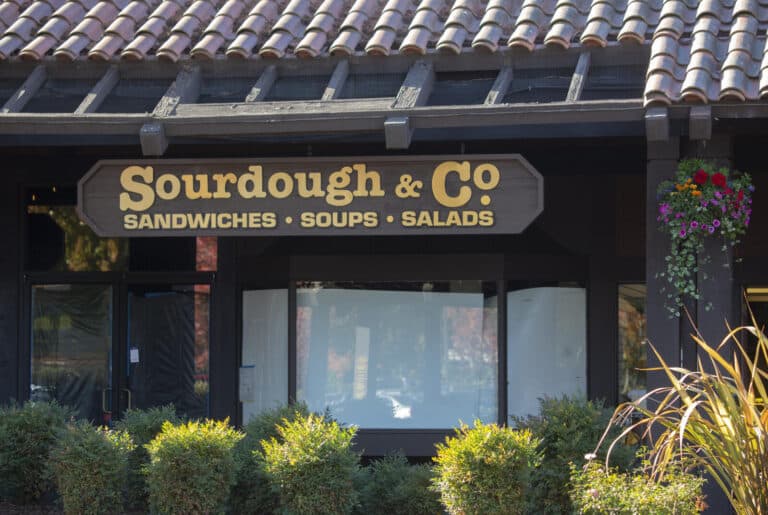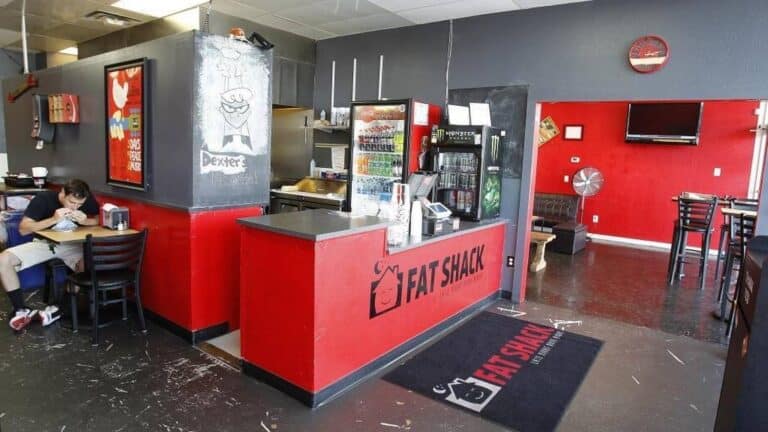Church’s Chicken Franchise FDD, Profits & Costs (2025)

Founded in 1952 by George W. Church Sr., Church’s Chicken, now called Church’s Texas Chicken in the Americas, is one of the largest quick-service chicken chains worldwide.
The first restaurant opened in San Antonio, Texas, near the Alamo, and became famous for its hand-battered, double-breaded chicken, Honey-Butter Biscuits, and home-style sides.
The franchise began expanding internationally in the 1970s and has grown steadily since. In 2021, High Bluff Capital Partners acquired the brand.
Church’s Texas Chicken celebrated its 70th anniversary in 2022, marking decades of bold flavors and warm hospitality. The brand stands out for its commitment to quality, preparing fresh chicken in small batches throughout the day.
The franchise continues to expand globally, with plans to open 100 new international locations and grow system-wide sales from $1.4 billion to over $2 billion by 2028.
Initial Investment
How much does it cost to start a Church’s Chicken franchise? It costs on average between $805,000 – $1,896,000 to start a Church’s Chicken franchised restaurant.
This includes costs for construction, equipment, inventory, and initial operating expenses. The exact amount depends on various factors, including the type of restaurant you choose, the location, and whether the franchisee chooses to lease or purchase the property. Indeed, Church’s Chicken offers 5 types of franchises:
| Franchise Model | Initial Investment Range |
|---|---|
| Blaze Compact Model | $1,119,150 to $1,631,300 |
| 1400 Blaze Image Model | $1,306,724 to $1,803,972 |
| 1700 Blaze Image Model | $1,609,600 to $1,896,300 |
| Conversion Restaurant Blaze Image Model | $743,038 to $1,305,700 |
| End Cap Blaze Image Model | $648,866 to $1,268,300 |
We are summarizing below the main costs associated with opening a Church’s Chicken 1700 Blaze Image Model franchised restaurant. For more information on costs required to start a Church’s Chicken franchise, refer to the Franchise Disclosure Document (Item 7).
Church’s Chicken 1700 Blaze Image Model
| Type of Expenditure | Amount (Low – High) |
|---|---|
| Development Fee | $10,000 – $10,000 |
| Initial Franchise Fee | $15,000 – $15,000 |
| Grand Opening Marketing Funds | $25,000 – $25,000 |
| Real Estate (purchase or lease) | Variable |
| Site Work | $250,000 – $480,000 |
| Building and Improvements | $738,000 – $750,000 |
| Equipment and Signs | $357,450 – $385,000 |
| Fees, Misc., Architectural and Engineering Services, Deposits | $50,000 – $150,000 |
| Initial Training | $0 – $23,000 |
| Opening Supplies | $6,350 – $12,700 |
| Insurance | $7,500 – $10,000 |
| Utility Deposits | $5,000 – $15,000 |
| Business Licenses | $300 – $600 |
| Additional Funds – 3 Months | $10,000 – $20,000 |
| Total Investment (excluding Real Estate) | $1,609,600 – $1,896,300 |
Average Revenue (AUV)
How much revenue can you make with a Church’s Chicken franchise? A Church’s Chicken franchised restaurant makes on average $1,256,000 in revenue (AUV) per year.
Here is the extract from the Franchise Disclosure Document:

This compares to $1,662,000 yearly revenue for similar chicken-style restaurant franchises. Below are 10 Church’s Chicken competitors as a comparison:

Download the Franchise Disclosure Document
Frequently Asked Questions
How many Church’s Chicken locations are there?
As of the latest data, Church’s Chicken operates over 900 locations worldwide. The majority of these locations are franchised, with a smaller number being company-owned. Church’s Chicken has a strong presence in the United States, as well as in several international markets.
What is the total investment required to open a Church’s Chicken franchise?
The total investment required to open a Church’s Chicken franchise ranges from $805,000 to $1,896,000.
What are the ongoing fees for a Church’s Chicken franchise?
Church’s Chicken franchisees are required to pay a royalty fee of 5% of gross sales. Additionally, there is a marketing fee of 5% of gross sales, which supports both national and local advertising campaigns. These ongoing fees are essential for maintaining brand consistency and promoting the business across all franchise locations.
What are the financial requirements to become a Church’s Chicken franchisee?
To become a Church’s Chicken franchisee, candidates must meet specific financial requirements. The minimum net worth required is $1 million, with at least $300,000 in liquid capital. These financial criteria ensure that franchisees have the necessary resources to cover startup costs and maintain operations during the early stages of the business.
How much can a Church’s Chicken franchise owner expect to earn?
The average gross sales for a Church’s Chicken franchise are approximately $1.26 million per location. Assuming a 15% operating profit margin, $1.26 million yearly revenue can result in $189,000 EBITDA annually.
Who owns Church’s Chicken?
Church’s Chicken is owned by High Bluff Capital Partners, a private equity firm. High Bluff Capital Partners acquired Church’s Chicken in 2021 through its affiliate Rego Restaurant Group, which also owns other restaurant brands. This acquisition is part of High Bluff’s strategy to invest in and grow established restaurant brands.
Disclaimer
Disclaimer: This content has been made for informational and educational purposes only. We do not make any representation or warranties with respect to the accuracy, applicability, fitness, or completeness of the information presented in the article. You should not construe any such information or other material as legal, tax, investment, financial, or other professional advice. Nothing contained in this article constitutes a solicitation, recommendation, endorsement, advertisement, or offer to buy or sell any franchises, securities, or other financial instruments in this or in any other jurisdiction in which such solicitation or offer would be unlawful under the franchise and/or securities laws of such jurisdiction.
All content in this article is information of a general nature and does not address the detailed circumstances of any particular individual or entity. Nothing in the article constitutes professional and/or financial and/or legal advice, nor does any information in the article constitute a comprehensive or complete statement of the matters discussed or the law relating thereto. You alone assume the sole responsibility of evaluating the merits and risks associated with the use of any information or other content in this article before making any decisions based on such information or other content.




